Key takeaways:
- The death penalty raises ethical questions about justice, morality, and the cycle of violence.
- Advocacy against the death penalty includes grassroots campaigns, personal storytelling, and digital engagement to shift public opinion.
- Emotional narratives and statistical evidence are crucial for effectively communicating the risks of wrongful convictions.
- Engaging local communities through personal experiences and workshops can facilitate deeper understanding and challenge preconceived beliefs about capital punishment.
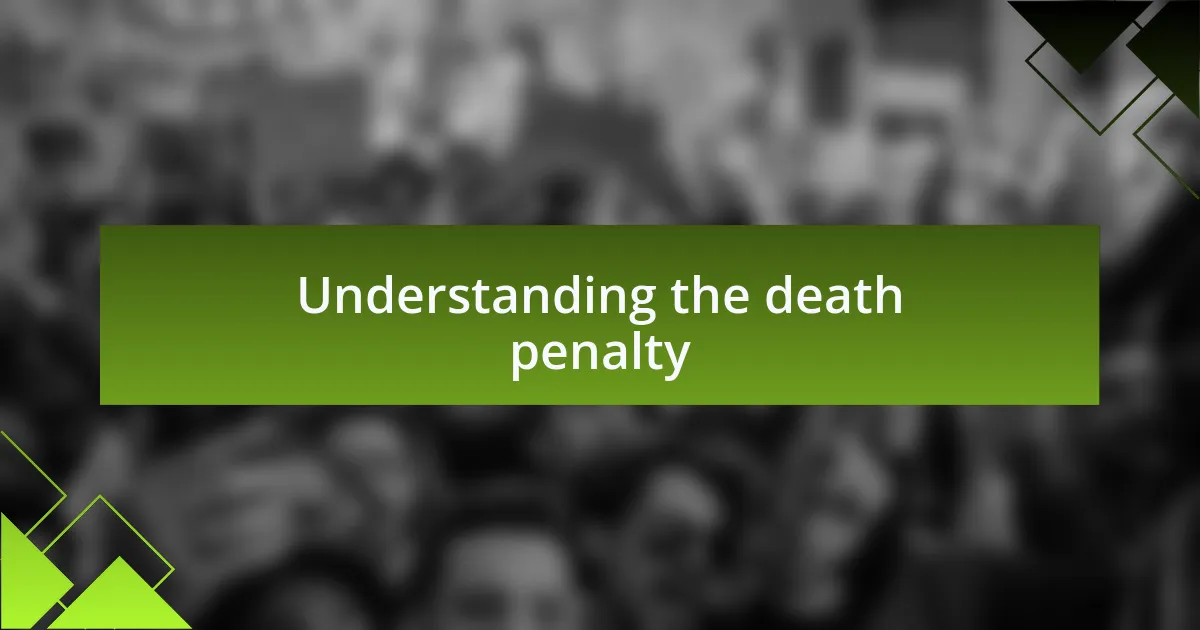
Understanding the death penalty
The death penalty, often seen as a symbol of justice, is a complex and polarizing issue. I remember a debate I had in college about its efficacy—many argued it deters crime, but I questioned whether fear truly fosters safety or simply masks deeper societal issues. It’s worth pondering: does the threat of execution genuinely deter would-be criminals, or are we just perpetuating a cycle of violence?
Many people might not realize that the application of the death penalty varies dramatically across different countries and states. When I traveled to Europe, I was struck by how most countries had abolished it, opting instead for rehabilitation over retribution. This brought forth an essential question: is our approach to justice truly reflective of our values as a society, or does it expose our lingering fears about punishment?
The ethical implications of taking a life in the name of justice often linger heavily on my mind. In conversations with friends and family, I’ve witnessed a wide spectrum of beliefs, yet I can’t help but reflect: how do we reconcile our moral compass with policies that allow for such irreversible actions? The more I delve into this topic, the more I realize that the death penalty forces us to confront uncomfortable truths about justice, value of life, and ultimately, our humanity.
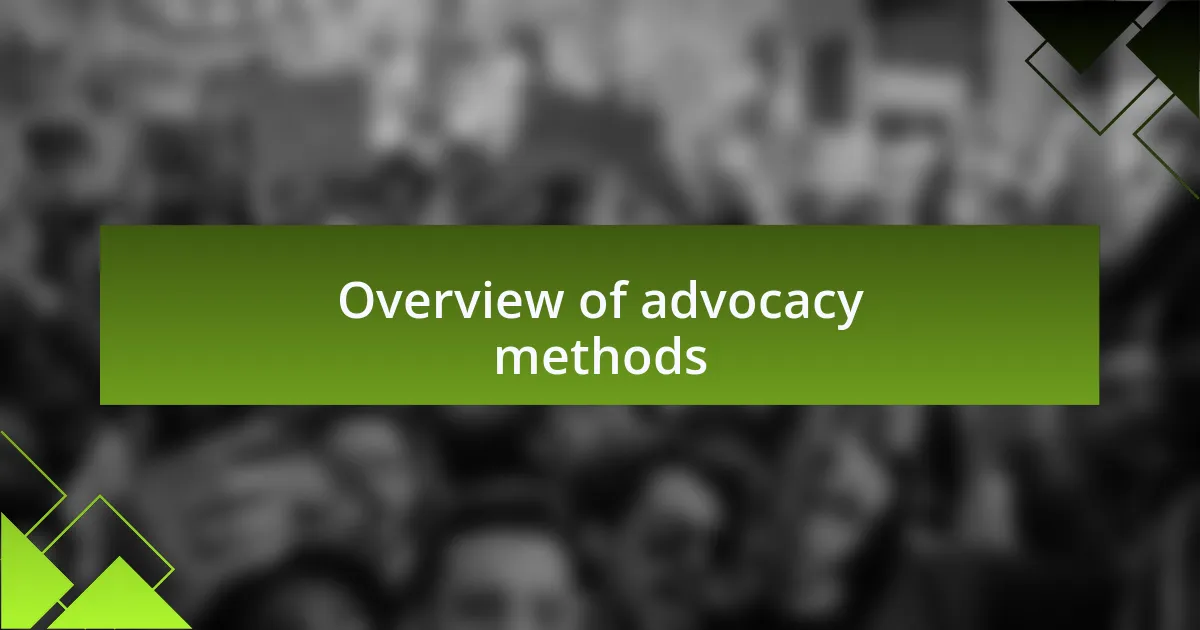
Overview of advocacy methods
Advocacy against the death penalty takes many forms, each aimed at raising awareness and shifting public opinion. Through my experiences, I’ve participated in grassroots campaigns that focus on community education, sharing powerful stories of those affected by wrongful convictions. Engaging with people on a personal level can ignite a spark of empathy—aren’t we all capable of understanding the fragility of life?
One effective method I’ve found is harnessing social media platforms to amplify voices that would otherwise go unheard. I remember posting about the emotional impact of losing a loved one to a wrongful execution; the engagement surprised me. It’s intriguing how digital storytelling can connect us, prompting countless discussions that challenge societal norms around justice—could one post truly shift a mindset?
Additionally, collaborating with local organizations helps in crafting tangible initiatives, such as petition drives or awareness events. I’ve seen how uniting our efforts can create a surge of energy that resonates within our communities. When we come together, can we not envision a future where we prioritize restoration over retribution?
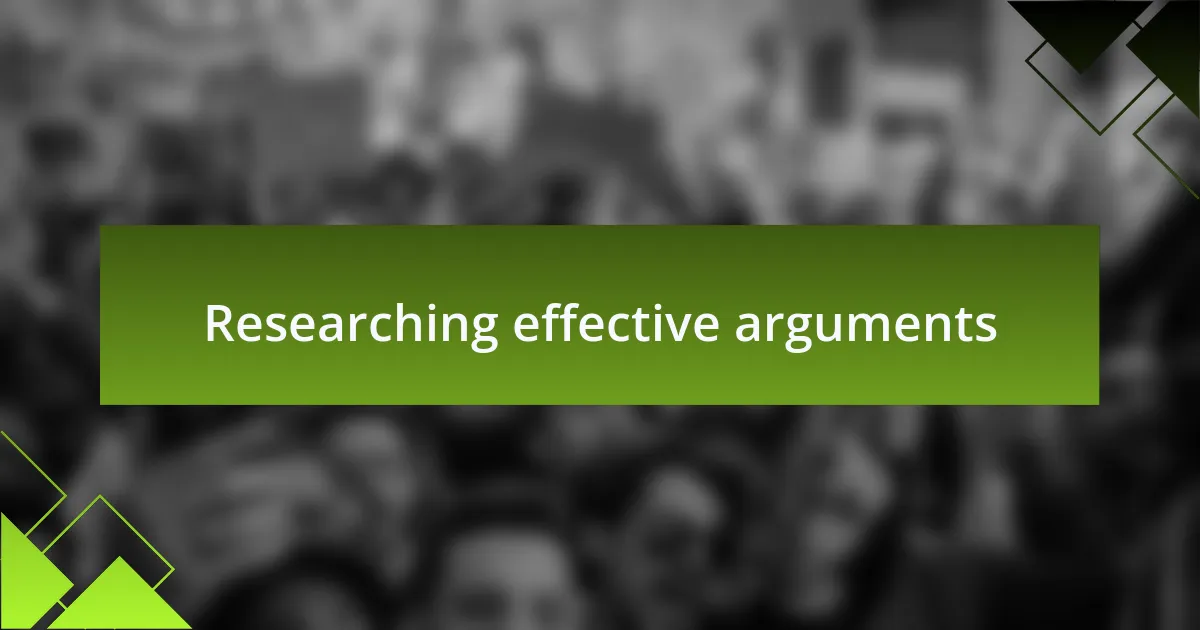
Researching effective arguments
When researching effective arguments against the death penalty, I’ve found it crucial to tap into both statistics and emotional narratives. I remember poring over case studies that revealed how often wrongful convictions occur; it’s staggering to think how many innocent lives might be extinguished. This blend of hard facts and poignant stories creates a robust framework that resonates with the heart and mind alike. Can data really tell a story? I believe it can—especially when it’s paired with personal accounts of those who’ve lived through the pain of loss.
Diving into the philosophical aspects of justice also enriches my advocacy. Reflecting on theories of punishment often leads me to question what we genuinely value as a society. One day, after discussing the moral implications with friends over coffee, I was struck by how they had never considered that the death penalty could perpetuate a cycle of violence rather than provide closure. Engaging in these conversations opens doors to new perspectives, doesn’t it?
Lastly, I place great emphasis on studying historical context. Understanding how the death penalty has evolved—and often been repealed in several countries—provides compelling evidence that change is possible. I recall an insightful discussion during a community forum, where someone pointed out that societal values shift over time. Isn’t it hopeful to think that awareness can lead to reform, drawing us closer to a future that embraces humanity over punishment?
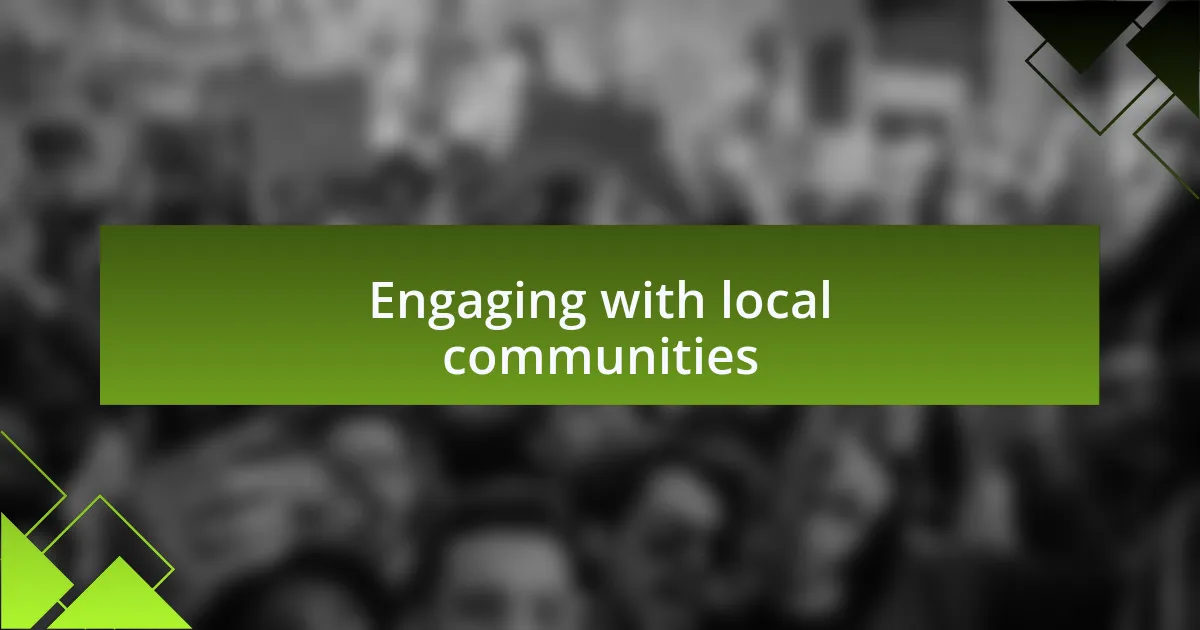
Engaging with local communities
I’ve found that engaging with local communities is essential in advocating against the death penalty. Recently, I attended a neighborhood meeting where people shared their stories about family members lost to violence. It struck me how these conversations can pave the way for deeper understanding. When we listen to each other, doesn’t it open our hearts and minds to the complexities of justice?
One memorable experience was when I coordinated a workshop in a local community center. It was incredible to see participants, some of whom had never viewed the death penalty critically, begin to unpack their beliefs. As we shared facts and stories, it became clear that many felt conflicted. How often do we challenge the ideas we’ve grown up with? In this safe space, I could see shifts happening; it’s in these moments that real advocacy takes root.
Another powerful way to engage is through local storytelling events. I organized an evening where speakers shared personal narratives related to wrongful convictions. The mood was palpable as listeners absorbed the raw emotion of those affected. Isn’t it fascinating how storytelling can turn abstract concepts into concrete realities? By connecting at this level, we create empathy and inspire action.
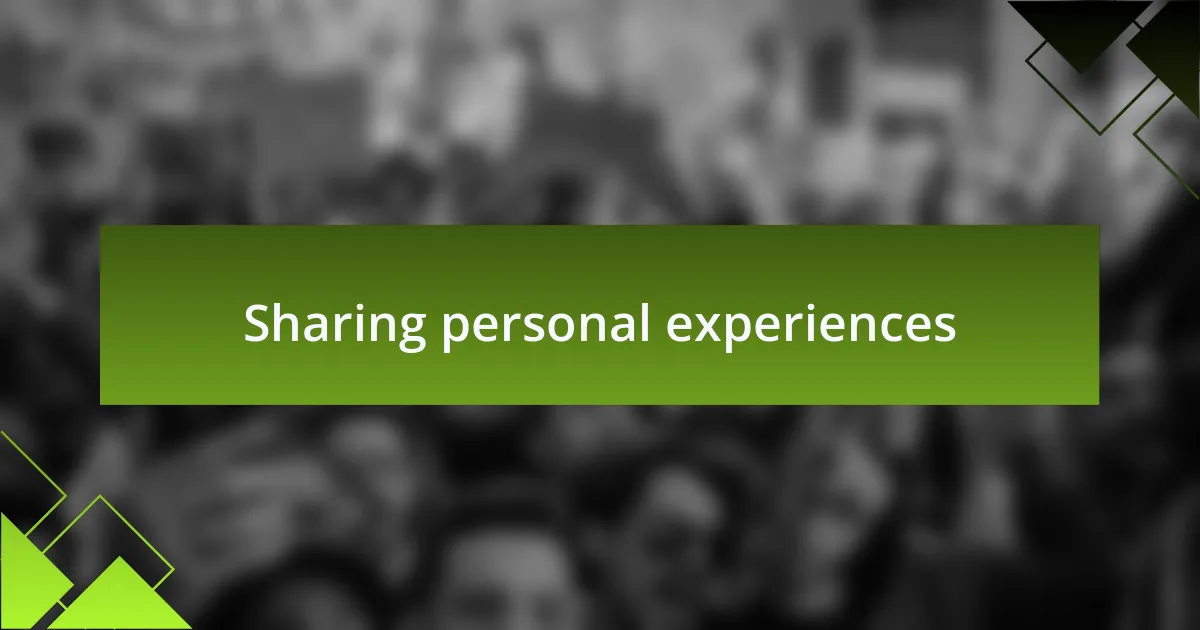
Sharing personal experiences
One of my most profound experiences occurred during a dialogue session with a small group of friends. We gathered around a kitchen table, sharing thoughts about the death penalty and its implications. As their stories unfolded, particularly one about a friend wrongfully convicted, it hit me just how deeply these narratives can influence our perspectives. Have you ever felt that shift when someone’s lived experience makes you reconsider your own beliefs?
At another event, I shared my own encounter with a family member who lost someone to violence. The vulnerability in that room was astonishing; it created an atmosphere where everyone felt safe to reflect on their feelings toward justice and forgiveness. I was surprised when others began opening up about their secrets and struggles with similar losses. How often do we create spaces like this where our collective grief can find understanding and healing?
There was a particularly eye-opening moment during a panel discussion where I listened to a former death row inmate share their story of redemption. His voice trembled as he recounted the nights spent contemplating life behind bars, and it left an indelible mark on my heart. What does it mean to believe in second chances, even for those deemed the worst of humanity? That night, I realized the importance of sharing human experiences—it’s not just about statistics; it’s about souls intertwined in a quest for justice and humanity.
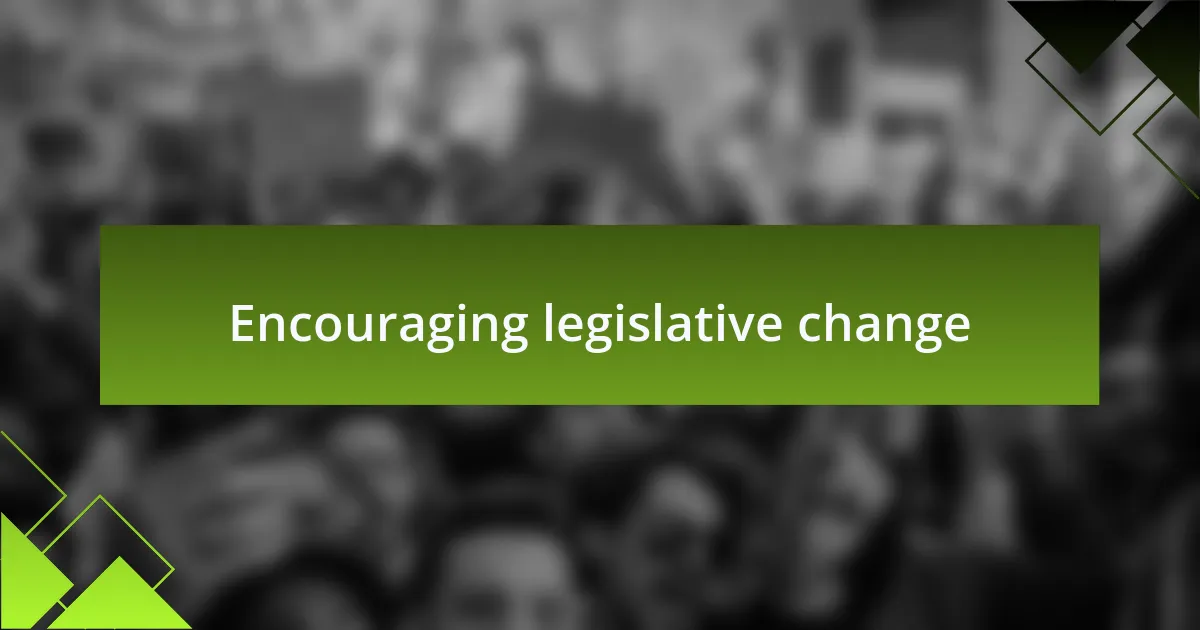
Encouraging legislative change
In my advocacy, I’ve seen firsthand how grassroots campaigns can stir legislative change. For instance, a local group I joined hosted several rallies, using our collective voices to draw attention to the unjust nature of the death penalty. Have you ever felt the electric energy of a crowd united for a common cause? Those moments resonate deeply, reminding legislators that change demands attention.
One fascinating approach I experienced was a letter-writing campaign aimed at our state representatives. I recall sitting down to write heartfelt letters, sharing not just statistics but personal stories about the real impact of capital punishment on families like mine. It was empowering to think that our words could influence someone’s decision. How compelling would it be if more people took action this way?
In conversations with lawmakers, I’ve realized the importance of being well-prepared. I remember a meeting where I presented compelling evidence against the death penalty, blending emotional appeals with factual data. When legislators see the human side of the issue, it can change their outlook. If we really want change, how can we not arm ourselves with stories and facts?